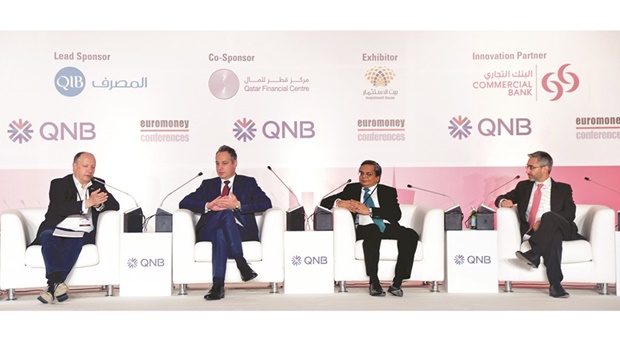“Going forward, with Europe trying to reduce its reliance on Russia, I think very few countries are in a position to be able to step up and Qatar sits in one of those happy spaces to be really able to come up on the global stage and play a major partner to one of the larger economies in the world,” Hemani told a Euromoney Qatar Conference panel session ‘Global and Qatari macro outlook’.
The European Commission plans to cut EU dependency on Russian gas by two-thirds this year and end its reliance on Russian supplies of the fuel "well before 2030". The Russia-Ukraine crisis has prompted the European Union to look for alternatives to Russian gas imports, which constitute about 40% of consumption annually.
The EU’s planned diversification from Russian gas could have important implications for Qatar and, more specifically, QatarEnergy, global credit rating agency Standard & Poor's had said in a report.
Terming that the (North Field) expansion is “very timely”, Hemani said Europe at present imports roughly 77bn tonnes of liquefied natural gas and Qatar supplies 24% of the total.
“There is much more room to grow and it is a win-win situation for both (Qatar and Europe) because Doha is now heavily focused on Asia, where it faces stiff competition from Australia in terms of supply,” he said at the panel meeting, moderated by Richard Banks, senior adviser, Euromoney.
Asserting that gas will continue to play a much longer role in the life cycle of hydrocarbon industry; he said Qatar made a timely decision (in expanding its output).
The North Field Expansion is set to increase Qatar’s liquefaction capacity from 77mn tonnes per year to 110mn. A second phase of expansion, North Field South (NFS), is slated to enhance capacity to 126mn.
He said the government would continue to invest in the domestic economy to the extent that it can properly be absorbed.
The country would continue to use large part of hydrocarbon revenues to go ahead with external diversification to prepare the country against the volatile cycles of oil prices, according to him.
Akber Khan, senior director, Asset Management, Al Rayan Investment, said once the North Field expansion is over, Qatar would be producing 8mn barrels of oil equivalent per day.
He said year-to-date, S&P500 and MSCI emerging markets are down about 15% but Qatar equity market is up 15%, partly explained by the commodity boom.
In the long term transition to the greener economy, Qatar has two important distinct advantages that are gas and aluminium, he said.
Alexis Antoniades, director, Chair of International Economics, Georgetown University, said the diversification was imperative because of the growing young generation and there is a need to generate jobs, particularly in the private sector.
Qatar is at present developing clusters as engine of development in order to strengthen its diversification strategy, he said without elaborating.
In this regard, he mentioned the development of two smart cities: Msheireb and Lusail.
The European Commission plans to cut EU dependency on Russian gas by two-thirds this year and end its reliance on Russian supplies of the fuel "well before 2030". The Russia-Ukraine crisis has prompted the European Union to look for alternatives to Russian gas imports, which constitute about 40% of consumption annually.
The EU’s planned diversification from Russian gas could have important implications for Qatar and, more specifically, QatarEnergy, global credit rating agency Standard & Poor's had said in a report.
Terming that the (North Field) expansion is “very timely”, Hemani said Europe at present imports roughly 77bn tonnes of liquefied natural gas and Qatar supplies 24% of the total.
“There is much more room to grow and it is a win-win situation for both (Qatar and Europe) because Doha is now heavily focused on Asia, where it faces stiff competition from Australia in terms of supply,” he said at the panel meeting, moderated by Richard Banks, senior adviser, Euromoney.
Asserting that gas will continue to play a much longer role in the life cycle of hydrocarbon industry; he said Qatar made a timely decision (in expanding its output).
The North Field Expansion is set to increase Qatar’s liquefaction capacity from 77mn tonnes per year to 110mn. A second phase of expansion, North Field South (NFS), is slated to enhance capacity to 126mn.
He said the government would continue to invest in the domestic economy to the extent that it can properly be absorbed.
The country would continue to use large part of hydrocarbon revenues to go ahead with external diversification to prepare the country against the volatile cycles of oil prices, according to him.
Akber Khan, senior director, Asset Management, Al Rayan Investment, said once the North Field expansion is over, Qatar would be producing 8mn barrels of oil equivalent per day.
He said year-to-date, S&P500 and MSCI emerging markets are down about 15% but Qatar equity market is up 15%, partly explained by the commodity boom.
In the long term transition to the greener economy, Qatar has two important distinct advantages that are gas and aluminium, he said.
Alexis Antoniades, director, Chair of International Economics, Georgetown University, said the diversification was imperative because of the growing young generation and there is a need to generate jobs, particularly in the private sector.
Qatar is at present developing clusters as engine of development in order to strengthen its diversification strategy, he said without elaborating.
In this regard, he mentioned the development of two smart cities: Msheireb and Lusail.


